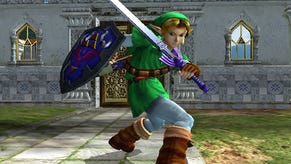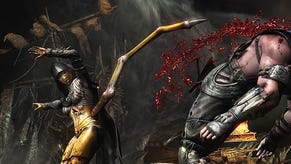USgamer Answers: How Much Game Violence Is Too Much?
Mortal Kombat X inspires the team to ponder where their personal line on video game violence is.
This article first appeared on USgamer, a partner publication of VG247. Some content, such as this article, has been migrated to VG247 for posterity after USgamer's closure - but it has not been edited or further vetted by the VG247 team.
Mortal Kombat X is finally available at retail, featuring some of the most gruesome and outlandish fatalities Netherrealm could dream up. Each fatality is backed back the game's incredibly detailed characters, with full skeletal and organ systems. That means every hit, every break, and every evisceration is shown in gory detail. For some, Mortal Kombat X's fatalities are simply a bridge too far, tearing apart any sense of taste the series may have still held on to.
When it comes to game violence everyone has a different line in the sand. Actions, context, and presentation all matter. Some who had no problem running over citizens in previous Grand Theft Auto games had issues with the interactive torture scene in Grand Theft Auto V. Mike noted back in October how many enthusiast players had problems with the content of Destructive Creations' Hatred. Even something as ever-present as Activision's annual Call of Duty series is distasteful to certain players.
This week, the team at USgamer is answering these questions: What's your personal line when it comes to video game violence? At what point do you check out? And how much digital violence is simply too much for you?
Kat Bailey, Senior Editor
I guess 'the line' for violence is a lot like the definition of porn: "I know it when I see it." There have been times when Game of Thrones has crossed the line for me, particularly last season, but I've mostly put up with it knowing that the Seven Kingdoms are meant to be a brutal place. A lot of my favorite shows, games, and movies are incredibly violent — Kill Bill, God of War, and Archer, just to name a few.
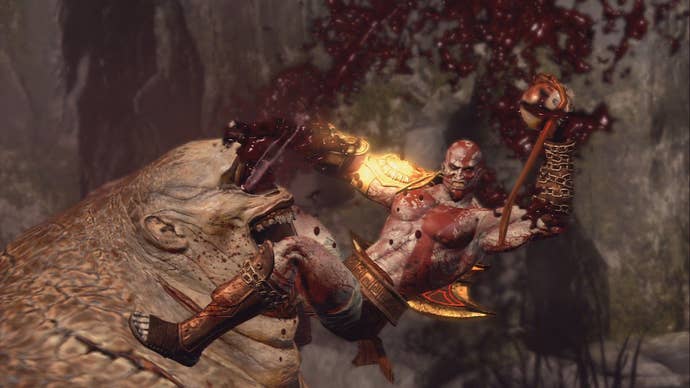
Like anything else in the media, violence is one element of a complex visual palette. It can be used to accentuate the horror of a particular situation, or it can imbue the story with a sense of the absurd. Taken in a vacuum, for instance, Hot Fuzz is incredibly violent, with one guy's head being caved in by a piece of a church roof, and another woman getting a pair of shears stuck in her neck. But the manner in which the violence is deployed is also extremely deliberate, elevating the movie's comedy by contrasting with the horror of a slasher film — something Edgar Wright does incredibly well.
Where I start to get annoyed with violence in the media is when it's deployed for no other reason than to be shocking. The original Mortal Kombat, for instance, was shocking, but also incredibly cartoonish. It was meant to be ridiculous, and it was. Mortal Kombat X's Fatalities, by contrast, are so detailed as to verge on the pornographic. I had the same problem with God of War III, in which the game became so concerned with trying to top itself that it totally lost sight of anything resembling artistry and just gloried in the violence.
Video games in particular are in a tricky place when it comes to violence. The interactive nature of the medium makes it feel that much more immediate, and therefore that much more uncomfortable. A good example is Grand Theft Auto V's infamous torture scene, a particularly brutal scene in which the player is forced to be an active participant. But once again, it can be done very well. Spec Ops: The Line, which features mass graves and other gruesome imagery, is frequently cited as a fantastic piece of visual storytelling that does a fine job of deconstructing the shooter genre.
I guess that's the line for me. I don't have any great love of blood and guts — extreme violence in the media actually makes me feel ill — but I can appreciate it when it's deployed artistically, or in the service of a good story. When gore is introduced for its own sake, it becomes boring or just uncomfortable. The best writers, directors, and developers know how to walk that line. Plenty more don't.
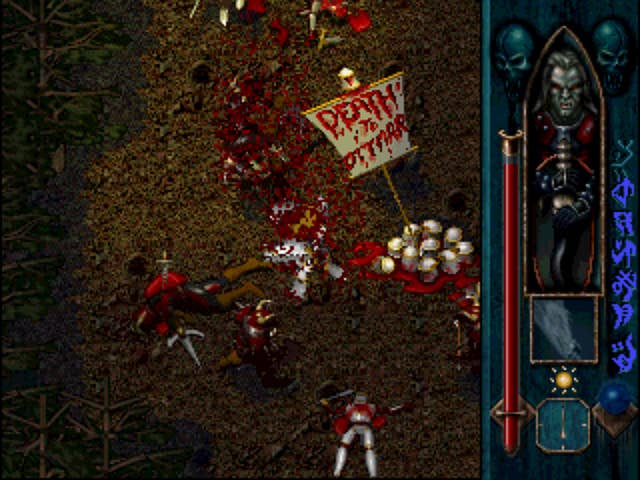
Jeremy Parish, Editor-in-Chief
For me, it's not the quantity of violence, it's the presentation. I accept that most action games are structured around violence, whether it's the shooting gallery style of Galaga or the tactical shoot-stab-or-stick combat triangle of Halo. But in most cases, it's all antiseptic — you're blowing up robots or drones or enemies whose asinine, simplistic behavior makes it hard to see them as thinking creatures.
What bothers me is when game a revels in violence, or allows options that seem wildly out of keeping with the tone of the rest of the experience, or forces you to kill the helpless. I think the first time game violence gave me pause was in Blood Omen: Legacy of Kain, in which you play a vampire forced to survive by drinking others' blood. OK, fair enough. But then you'd reach points where the only available blood to be had was from innocent, helpless, nonviolent villages chained to a dungeon wall. They'd squirm and beg to be set free, but your only available interaction with them was to drink them dry in order to top off your stamina. Sure, that's "realistic" for vampire lore, but it's not the kind of protagonist I want to play as. When I realized that victimizing these prisoners was necessary to complete the game, I set it down and never played Blood Omen again. The killing wasn't graphic or brutal, but I found the context too offputting for comfort.

More recently, there was BioShock Infinite. A candy-colored middlebrow morality tale on the face of it, Infinite's combat centered on perfectly tolerable gunplay — nothing inspiring, but nothing shocking, either. But the brutality of melee combat in Infinite made it feel like something from a different game entirely, with gruesome geysers of blood and sickening ragdoll physics. It wasn't intolerable, but it felt wildly out of place within the setting and totally incompatible with the humdrum shooting mechanics.
Generally, I tend to steer clear of games that go out of their way to bathe players in blood, figuratively or literally. I definitely have zero interest in Mortal Kombat, especially now that it's somehow evolved from campy blood sprays a la Monty Python's Black Knight to MKX's almost pornographic obsession with flaying and displaying the human body in every way imaginable. But hey, more power to anyone who's into that. I'd rather see people satisfying their inner psychopathic with a video game than by torturing their kidnap victims to death in some basement abattoir.
Bob Mackey, Senior Writer
While I've been playing video games since my earliest years, I didn't equate jumping on koopas, blowing up robot masters, or stabbing moblins with "violence" until I heard a neighbor's parents banned Nintendo from their household for this reason alone. As a kid with an extremely permissive single mom, this no-Nintendo policy seemed absolutely preposterous, but it taught me some people found the overarching goal of most video games (killing) highly objectionable, even during those primitive, 8-bit years.
As an adult, I don't consider myself a fan of violent media per se, but I can at least enjoy it when said violence is presented with some level of abstraction. I don't consider myself a huge fan of gore, for instance, but the significantly gory Evil Dead 2 is one of my favorite movies for the way it delivers horrific violence with a dose of unrealistic silliness--that geyser of blood blasting from the cabin's trap door comes to mind as a prime example. The same goes for games, too; the sight of bodies exploding in Fallout 3 and New Vegas didn't turn my stomach--those uncanny valley character models and their shiny, anatomical model organs popping out lean more towards hilarious than tragic. And even uber-violent games like Hotline Miami manage to keep me engaged, simply because the old-school veneer makes the absolutely brutal violence way more tolerable.
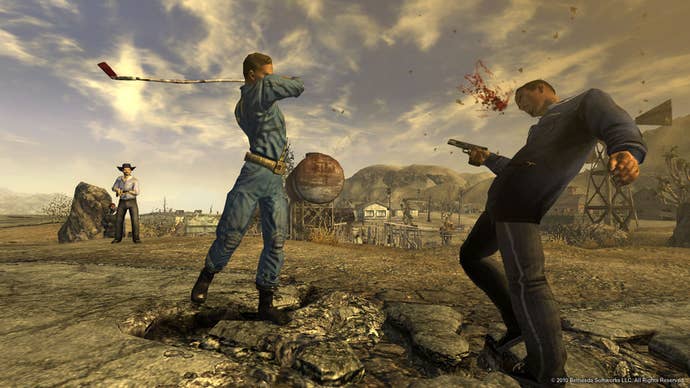
When violence becomes fetishistic, though, that's usually when I check out. The gross-out, "torture porn" fad of the '00s never really sat well with me, since the realistic and prolonged violence within them feels more like a snuff film than pure fiction. I kind of get the same feeling from the recent Mortal Kombat games, too; the fatalities are just as outlandish as before, but now we get glorious, lingering shots of photorealistic organs instead of an explosion of fuzzy sprites. And when violence hits too close to home, I'm not on board either. GTAV's torture scene killed my interest in the game, and the continued blitzkrieg of war-based FPSes doesn't appeal to me one bit because, hey--I've been paying attention to America's foreign policy for the last 15 years.
Strangely enough, I think we're on a bit of a downswing for video game violence; the PS2/Xbox era was riddled with plenty of games that asked, "What CAN we get away with?" but now, these cases are much rarer--mostly because a console game capable of graphic, photorealistic violence is so expensive to produce, it needs to avoid controversy at all costs. And that's good for all of us, because avoiding explicit violence usually leads to a much more creative solution.
Jaz Rignall, Editor-at-Large
I can happily shoot people all day in games like Call of Duty: Advanced Warfare. It's definitely violent, and sometimes deaths can look really painful thanks to the game's ragdoll physics, but the speed of the game and the fact that lives just fly by removes a certain level of realism, and makes the game feel more like a shooting gallery than a "murder simulator." Perhaps it's because I've played the game so much I've become desensitized to its violence, but I just don't really see the game - and other games of this type - as particularly egregious anymore. Kills are a necessary part of the game's mechanics, and they're dealt with as par for the course, and not overly-fetishized.
Sniper Elite III raises the stakes with its almost medical porn deaths but even even though it's pretty outrageous and gruesome in its presentation, I also find what it's doing reasonably acceptable. The thing is, the game is set in a war zone, and what the game is portraying is the violence of war, albeit in ridiculous, over-the-top detail. It's sort of fetishized, but at the same time, these are quick kills and there's no lingering on death and suffering. This is what happens in a war zone and the game is ultimately grounded on the mechanics and results of sniping enemy soldiers.

Where I draw the line is when a game revels in the deaths a little too long, and shows too much sadistic suffering in the name of entertainment. Mortal Kombat X does that, and I don't really like it. Some of its deaths are funny in a really gory kind of way, but it's not quite tongue-in-cheek enough for me. There's an element of realism about the victims' reactions that pushes the fatality vignettes too over the top, and while I can laugh at the image of someone being bashed to death with their own arms when it's done right, Mortal Kombat X just doesn't quite tickle my funny bone. It's just too grim, and plays it too straight for it to be entertainment to me. Indeed, it just kinda depresses me.
But even though I'm not going to play it, it doesn't bother me that it exists. I believe that developers should have the freedom to make the games they want to make. We have a rating system that's supposed to ensure that games designed for adults don't get played by kids, and as long as parents are responsible, that shouldn't happen. Of course it does, but responsible parenting and video games is not what we're talking about right now, so we can save that discussion for another time...
Mike Williams, Associate Editor
I fall in line with the rest of the crew in that the presentation of violence trumps the actions being taken. Like Jaz, I can shoot people all day long in Uncharted or other first-person shooters, because I retain a layer of unreality between myself and the actions being taken. Grand Theft Auto V's torture scene was odd, because it's merely another scene involving the player doling out death and violence to others, but for some reason, electrocuting this poor man while he plead for his life felt different than shooting a random pedestrian or running over them in my car. Maybe it's the interactive nature of it? I've seen enough people get tortured on film or in games, but having to directly control it myself removed that layer.
Likewise, I have no desire to play Hatred. I'm fine with the game existing, it's just not my thing. It feels excessive and over-the-top, without meaning or point. Perhaps, I need a point? I enjoyed the first Saw film, but subsequent entries left a poor taste in my mouth. Does the violence, if it's excessive and in-my-face, need to have a thematic or narrative point? That can't be the case either because I've exploded bodies in Dragon Age II and Ninja Gaiden with little issue. Dead Space 3 added other humans to the mix of foes you could dismember. Roplling it over in my head, I come back to that space between me and the actions being taken. I think that's what defines my line.
While the others have a problem with Mortal Kombat X, I'm fine with it. I'm not Scorpion, I'm not controlling every slice and squeeze during a fatality. The violence is gratuitous, but for some reason I spend all my time fascinated by the technology. (Yes, this makes me feel like the guy saying "Fascinating" in a zombie apocalypse film.) Imagine ten years ago thinking that the developer behind Mortal Kombat could visually simulate skeletons, muscles, and other organs. When someone's face slides off in MKX, the models are just so goddamn detailed that I'm in awe that this is what millions of dollars were spent on. It's amazing that we've gotten to this point, even if I sometimes wonder if the available tech is being put to good use. Is this the best we can do with it?
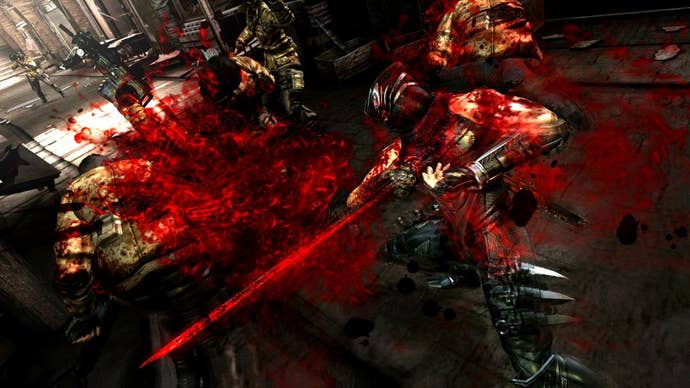
Removing obstacles in your way by pointing at and interacting with them is a basic mechanic in games; the only thing that's changed is how realistic those objects are. Sure, they're all digital, but sometimes, digital things can make you feel. Fake actions can excite you or you can feel attached to fake digital people; my guess is most of us who play games feel excitement and joy from our interactions with digital things. So the opposite can be true as well. They absolutely retain the ability to sadden or disgust you, to feel that the art has crossed a personal line. To say otherwise is to lessen the power of games as entertainment altogether. Everyone has that line, yours is just different from mine.


